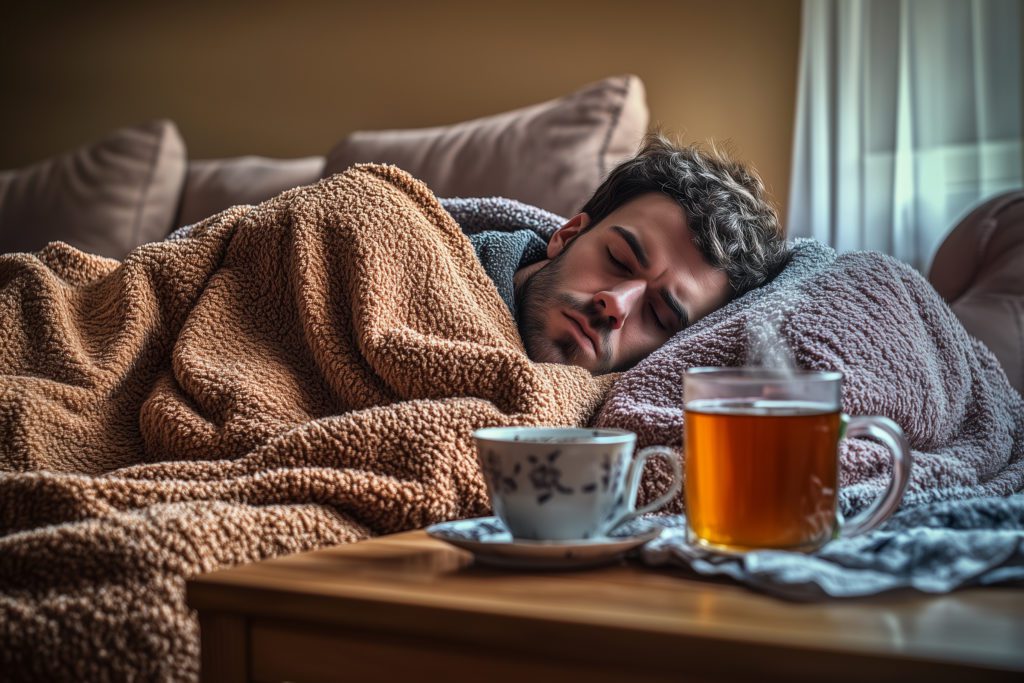
Gut Health and Flatulence: How Probiotics and Digestive Health Impact Nighttime Gas
Learn what can cause nighttime flatulence and discover tips for preventing gas that focus on diet and digestive health.

Has your partner told you that you pass gas while asleep? Or, perhaps, you feel as though the second you lie down, the amount of flatulence you have increases exponentially, leaving you questioning this odd (and sometimes embarrassing) insurgence.
If you’re ever worried you’re passing too much gas, especially at night, rest easy knowing it is not medically uncommon. Still, flatulence may be a sign of imbalance in your gut health, but there are steps you can take to improve your digestive health and lessen nighttime gas.
From modifying what you eat during the day to implementing digestion-boosting habits, you don’t have to feel ill-prepared against nighttime gas and the discomfort that can come with it.
What Causes Nighttime Gas?
While it may be one of the bodily functions that we most want to hide, having gas is entirely normal, with most people passing gas around 14 times a day. Sometimes, though, it can feel like you pass more gas at night than during the day, and you would be right; the anal sphincter relaxes at night, which allows gas in the large intestine to release. However, how much nighttime gas you experience depends on how much gas is in your large intestine.
The following habits can cause more gas to build in the body, which results in flatulence.
Swallowing Air
When you swallow air, it needs to escape the body in some way, and this may be through gas.
You may not realize all the ways that you can swallow air (instead of breathing it in), but some include:
- Smoking
- Eating or drinking too fast
- Wearing loose dentures
- Chewing gum
- Drinking through a straw
Addressing these areas can help you lessen the amount of air you swallow, reducing the amount of gas that needs to be released from the body.
Diet
Some foods and beverages have a higher likelihood of causing gas because the body struggles to digest them fully. When these not-fully-digested foods reach the large intestine, bacteria break them down and create gas as a by-product.
The top culprits include:
- Onions, beans (especially pinto, navy, and black), mushrooms, and cruciferous vegetables
- Peaches, apples, and pears
- Carbonated drinks
- Drinks containing high fructose corn syrup
- Lactose-containing foods: milk, ice cream, cheese, and certain packaged foods
- Fiber additives (e.g., fructooligosaccharide and inulin)
- Artificial sweeteners (e.g., mannitol, sorbitol, and xylitol)
Having an intolerance, such as lactose intolerance or fructose intolerance, is one reason why these foods can cause flatulence. Some people’s bodies may have a harder time breaking down these compounds, which can cause gas alongside bloating or diarrhea. The appearance of these intolerances may be tied to imbalances in the gut’s microbiome, meaning probiotics may help lessen their symptoms.
Even though the above foods are common causes of gas, not everyone has that response to them. The best way to determine which foods are flatulence-triggering for you is by keeping a food diary, as it allows you to note the foods you eat and your symptoms to draw connections and pinpoint which foods may need to be avoided.
By avoiding or reducing the amount of flatulence-inducing foods and beverages you consume, you may be able to reduce your gas.
IBS
Irritable bowel syndrome (IBS) is a condition affecting the small and large intestines, which can cause gas alongside cramping, bloating, constipation, diarrhea, and abdominal pain.
While there are many potential causes of IBS, those with this condition often find success in managing their symptoms by making certain changes, such as:
- Eating smaller, more frequent meals
- Eating meals at the same time each day
- Keeping a food diary to identify trigger foods and beverages
- Avoiding trigger foods and beverages when possible
- Drinking plenty of fluids
Celiac Disease
Celiac disease is an autoimmune condition where the small intestine becomes damaged when someone eats gluten. In addition to gas, celiac disease may cause headaches, anemia, fatigue, and depression or anxiety.
This condition can be diagnosed through an endoscopy completed by a healthcare professional, during which a tissue sample from the intestines is taken and tested. For those who have been diagnosed with celiac disease, following a gluten-free diet will help reduce the painful symptoms.
Medication Side Effect
If you’ve started taking a new medication and noticed that your nighttime gas has also gone up, it may be a side effect of the medication.
The medications that most often cause gas include:
- Certain laxatives
- Nonsteroidal anti-inflammatory drugs (NSAIDs), like ibuprofen
- Statins
- Antifungals
If you believe that your medication is causing excess gas, talk to your doctor about an alternative option.
How to Prevent Nighttime Gas
Ready to lessen your nighttime gas? Start by looking at the food you eat; understanding what foods can cause gas—and avoiding them—can help make your nights less gassy.
If you suffer from nighttime flatulence, try avoiding or limiting the following foods and beverages:
- Fried foods
- Carbonated drinks
- Sugar
- High-fat foods
Some people may also find that high-fiber foods can cause gas. This may be especially noticeable if you have increased your fiber intake rapidly. Instead, try to limit your intake for a few weeks and then gradually increase it.
You can also implement habits good for digestion to lessen the likelihood of gas, such as:
- Avoiding smoking, chewing gum, and drinking through straws
- Eating smaller, more frequent meals
- Eating and drinking slowly
- Drinking plenty of fluids
- Exercising regularly
- Drinking peppermint tea
- Waiting 2-3 hours after eating to lie down
Furthermore, if you have a specific condition, such as IBS or celiac disease, avoiding trigger foods, as recommended by a health professional, can help prevent gas.
You could also try taking a probiotic supplement, with one study finding that probiotics help reduce bloating and gas in patients with IBS. They accomplish this by restoring the gut’s microbiome, meaning digestion becomes more efficient and less food passes through undigested.
Don’t Let Gas Keep You Up
Nighttime gas can keep you awake, especially if it’s accompanied by painful bloating and camps. However, monitoring the foods you consume and implementing digestion-friendly habits can prevent nighttime gas, allowing you to sleep easier.
If your gas is ever accompanied by the following, though, reach out to a doctor:
- Unintentional weight loss
- Constipation or diarrhea
- Sudden changes in symptoms
- Blood in stool
- Recurring stomach pain or bloating
The habits we implement during the day can make our night easier—check out Pillow’s resource library for more tips on improving your sleep.

Written by
Jessica G
Medical writer freelancer who has written hundreds of articles on varying topics. Masters of Engineering degree in Biomedical Engineering.
Download Pillow
Get help
Press & News
Legal
Connect
X (Twitter)
Company
Copyright © Neybox Digital Ltd.



